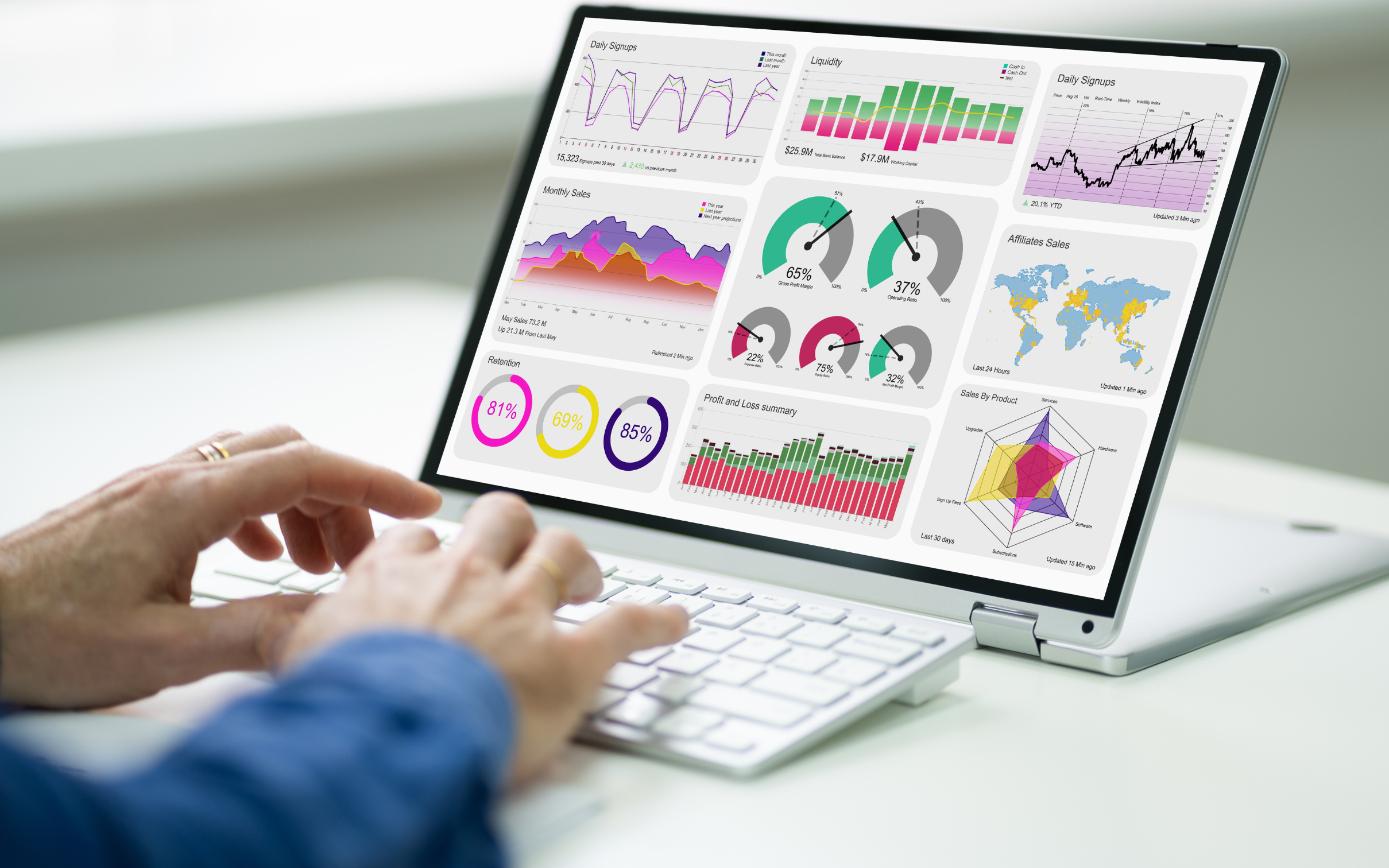Website Analytics Tools: Being online is important for any business or company, especially for small companies. But that is not enough; it is also necessary to know about the effect of your website and the way in which the users are behaving on it. This is where the website analytics tools give their best performance.
These Website Analytics Tools are precious for better understanding the traffic on your website, users’ actions, and the website’s performance in general, allowing you to build an effective strategy based on facts.
What are Website Analytics Tools?
Web analytics tools are defined as web applications that enable the collection, measurement, analysis and reporting of data concerning the websites and the users of these sites. They record features like visitors, pages visited, propulsive rates, bounce rates, and conversion rates among others.
Using this data, you will become more knowledgeable about your audience. You will be able to determine where they may be experiencing difficulties as well as where you may need to employ better strategies on your webpage.
Features of website analytics tools
1. Traffic Analysis: Monitor the unique visitors, hits/ pageviews, the number of visits, and many other related traffic statistics.
2. Audience Analysis: To understand who is visiting the app, it is crucial to analyze visitor demographics, geographic locations, devices they are using, or other audience traits.
3. Behavior Analysis: See how users interact with the site in terms of the sites they have visited, the number of times visited, time spent, etc.
4. Conversion Tracking: Track and analyze leads by tracking page views and conversion rates like submissions, downloads, or any purchases.
5. Campaign Analysis: Look into the pace of your marketing campaigns and assess the impact of paid ads, emails, and social media posts.
6. Real-time Reporting: Contact us with the latest information that will help you change your strategy as soon as it is needed.
7. Customizable Dashboards and Reports: Use different presentations with specific targets and values that would seem more comfortable for you.
8. Integration Capabilities: The key platforms that it can integrate with are content management systems, email marketing platforms, and customer relationship management systems.
Advantages of Analyzing Websites Using Tools
1. Understand Your Audience:
Website analytics tools effectively enable audience analysis from which navigators of the site gain important information about the external environment through online data such as demographic information, geographic information, and the type of devices used, among others.
2. Optimize User Experience:
For example, by looking at page views, bounce rates, click-through rates, etc., you could realize that customers are experiencing difficulty with any aspect of your site. This is where web development companies play a crucial role—they analyze data-driven insights and translate them into actionable improvements, optimizing your website’s structure, information architecture, and design to enhance overall customer communication and engagement experiences.
3. Measure Marketing Effectiveness:
Through website analytics tools, it becomes a more straightforward thing to track and evaluate the effectiveness of your marketing strategies, such as paid marketing, e-mail marketing, and social media marketing.
4. Identify Conversion Opportunities:
Conversion tracking is another essential characteristic of the website’s analytics tools, which enable a user to provide an evaluation of actions that are related to a specific goal, be it a submission of a form or completion of a purchase or a download.
5. Make Data-Driven Decisions:
Web analytics tools offer a great help to any business as results and insights can contribute to strategic business development. Through trends, patterns, and correlations analysis, one can avoid potential errors regarding website design, content type, and products to develop, as well as the correct marketing strategies to employ.
How to choose the best website analytics tools
1. Determine Your Needs and Requirements:
Some of the factors that need to be considered include analyzing the business needs of the company and your website, as well as the key performance indicators you wish to measure. Do you require another level of understanding of the user behavior?
Does conversion tracking matter to your company? Do you need real-time figures or reports more often than once a year? It is essential to think about the specific functional requirements that have to be met.
2. Consider the Tool’s Capabilities:
Assess the strengths and weaknesses of the tools you are using in the evaluation of website analytics. Some of the standard features to consider for a marketing analytics tool include traffic analysis, audience analysis, behavior analysis, conversion analysis, campaign analysis, and real-time reporting.
3. Ease of Use and User-Friendliness:
Website analytics tools can be multifaceted; there are a number of options available, each with various capabilities. Search for tools that have simple, graphical interfaces, flexible and healthily customizable personal panels, and well-interpretable overviews.
4. Scalability and Flexibility:
While keeping your website analytics needs uncomplicated may be logical when you’re just starting, there may come a time in the future when the growing complexity may warrant a change.
5. Data Privacy and Security:
Web analytics tools gather and accommodate a wide variety of user information; thus, data confidentiality must be top-ranked. Compare its data privacy/processing features, adherence to specific laws and standards like GDPR and CCPA, and the overall security of the tool/platform for your and your users’ data safety.
Top 12 Website Analytics Tools
1. Google Analytics
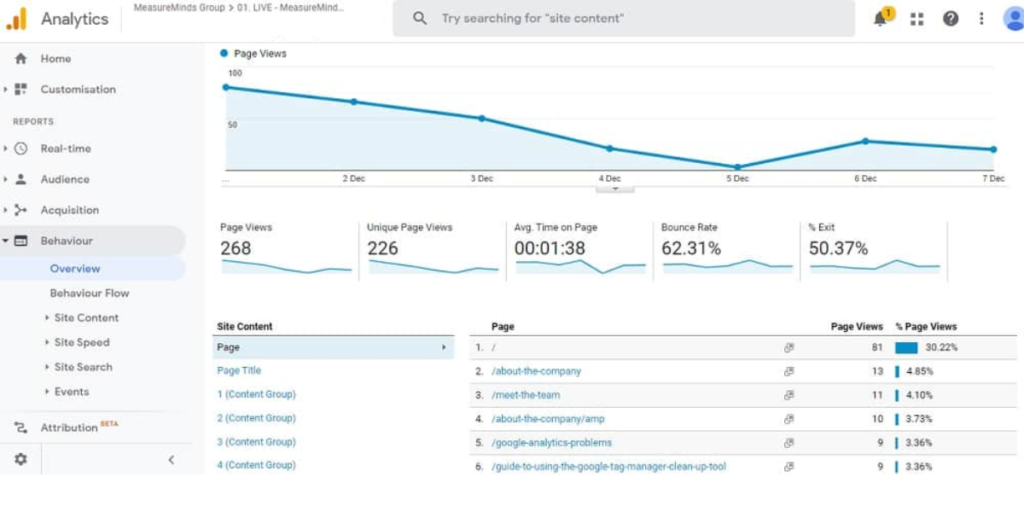
Google Analytics is a statistical service company founded by Google to monitor and analyze the details of a website’s visitors. It slows down the traffic source, user activity, converting activity, and audience characteristics. Some of the standard features of GA include real-time statistics, bespoke specified dashboards, and an easy interface with other Google products to give one of the most used analytics platforms.
Key Features:
- Real-time reporting
- Specific panels and tables
- Additional integration with Google Ads and other platforms
- Segmentation and setting of alerts to more complex level
Pros:
- Free to use
- Information about the traffic situation and its trends
- This site is updated frequently with new additions of products and services to meet the client’s demands.
Cons:
- The provided customer support is essential, and there seem to be very few avenues for seeking assistance.
- The steeper learning curve for advanced features.
- Methods of data sampling when dealing with large websites
Website: https://analytics.google.com
2. Mixpanel
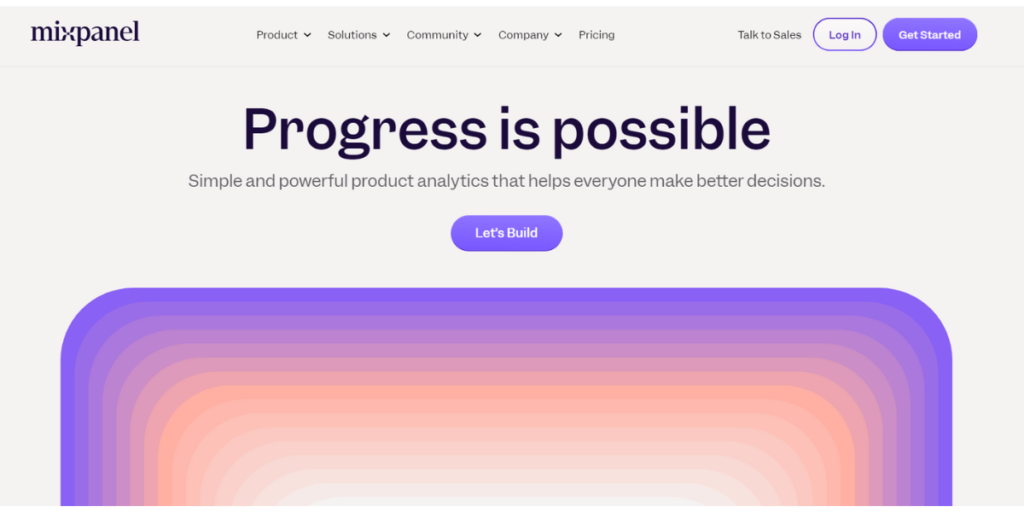
Mixpanel is a product analytics tool that enables developers and businesses to understand better how users engage with their websites and mobile applications. It emphasizes on tracking the users’ behavior patterns, analyzing conversion paths, and features complex segmentations. Mixpanel makes it easy to track customer behavior by being in real-time processing, facilitating ease of user interface.
Key Features:
- Monitoring of elaborated user behavior
- Advanced segmentation capabilities
- Conversion funnel analysis
- Experimentation and tracking, including split testing
Pros:
- Frequent and highly detailed user activity tracking
- Intuitive user interface
- Many integration options if the system is used.
- Real-time data processing
Cons:
- It is priced higher than most simple web analysis platforms and tools.
- There is very little variety in the traffic.
- It is not very user-friendly, especially if one wants to delve deeper into the intricacies of a given program or software.
Website: https://mixpanel.com
3. Kissmetrics
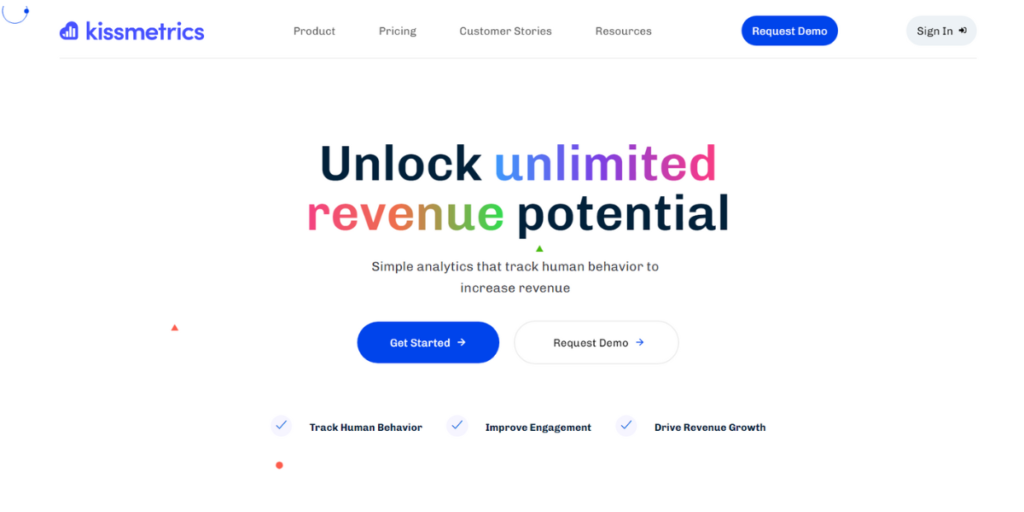
Kissmetrics is a customer engagement and analytics tool that makes it easier for businesses to track the behaviors of customers on various touch points such as websites, mobile applications, or emails. Capabilities for cohort analysis, tracking the Customer Lifetime Value, granular mapping of the CCM, and fully automated sending of mailings depending on the user’s behavior.
Key Features:
- This entails developing a detailed map of the entire customer process.
- Programmatic e-mail marketing communication
- Higher level of segment and filter
Pros:
- Comprehensive Customer Behavioural Knowledge
- This tool has great potential for marketing automation.
- Enables tracking of data across any number of data points
Cons:
- Expensive pricing plans
- Steeper learning curve
- Little funds available for customer support
Website: https://www.kissmetrics.com
4. Adobe Analytics
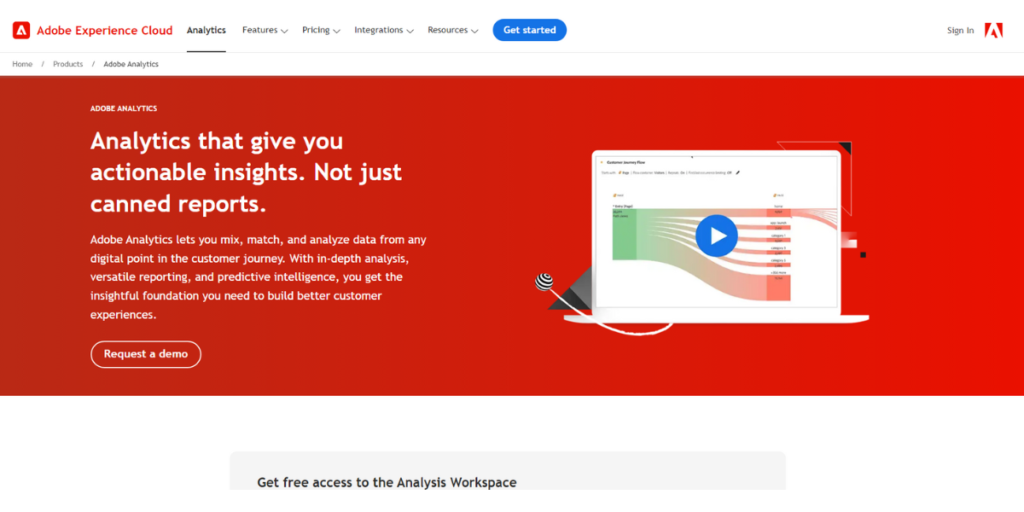
Adobe Analytics is an omnichannel web analytics tool that is a part of Adobe Experience Cloud, giving accurate, customized, and detailed information about websites and customers. It has artificial intelligence and machine learning elements and processes data in real-time; besides, it integrates with other Adobe tools, which makes it a valuable tool for analyzing large and massive amounts of data in an enterprise environment.
Key Features:
- More mechanical and hierarchical segmentation coupled with probability algorithms.
- Real-time data processing and analysis and data presentation
- Integration of the solution with other Adobe Experience Cloud ones
Pros:
- Effective tools for reporting and communicating the compliance programs’ performance.
- Utilizing advanced AI and machine learning
- Many features of this package complement its compatibility with the Adobe line of products.
- Enable customer support and customer help
Cons:
- One major weakness is the high prices
- High learning capabilities are required to master the intricate characteristics of the app.
- Limited level of customization based on templates
Website: https://www.adobe.com/analytics/
5. Matomo (formerly Piwik)
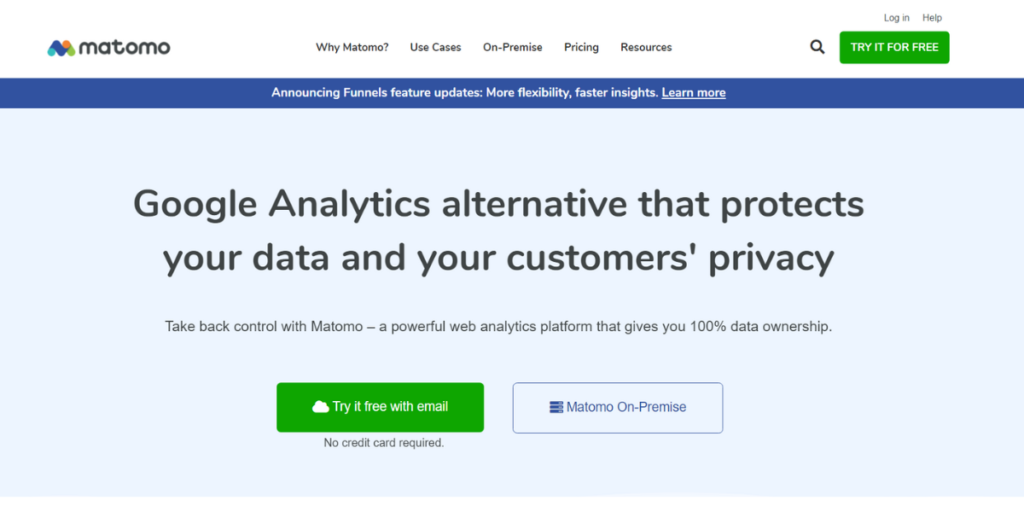
Matomo is the software that is designed for processing and analyzing information collected through web analytics programs; its deployment is possible both on the internet and on the corporate local area network infrastructure. This focuses on data privacy and security, offering in-depth snapshots of visitor behavior, including custom-built widgets and panel statistics, as well as granular data protection options. Matomo is very flexible with features and is fine for companies that may have specific policies against sharing information.
Key Features:
- Increased vigilance on the visitor’s/clients’ activity.
- Highly configurable with the possibility of personalized view of analyses in the form of dashboards and reports.
- CRM connectivity with content management systems
- Additional strong data protection measures.
Pros:
- Open to all and fully configurable
- Less emphasis on the value of data privacy and protection
- It is versatile and can be installed and run from the host’s server or on the cloud.
- On the matter of pricing, it was noted that on-premises solutions do not have to be expensive to offer.
Cons:
- Low and frequently inadequate customer service
- The user interface may be less intuitive
- Has less intricate functionalities than the comprehensive applications for business enterprises
Website: https://matomo.org
6. Open Web Analytics (OWA)
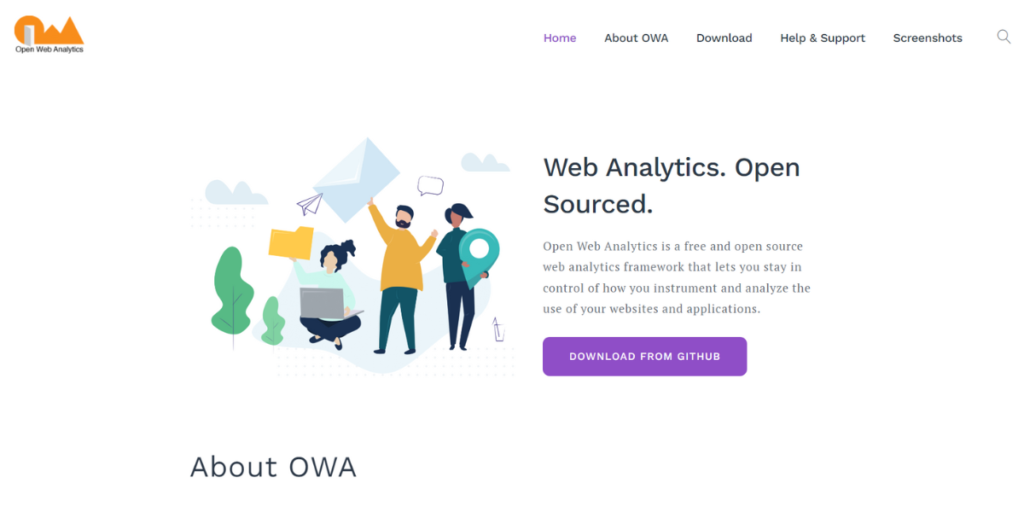
Open Web Analytics (OWA) is a production-level, accessible, and open-source web analytics software that can be installed on a local server or can be a web-based application hosted in the cloud. Many Web analytics tools provide simple navigation and analysis tools such as real-time visitor monitoring, customizable reports and graphical interface, and goals and conversions tracking.
Key Features:
- Real-time visitor tracking
- Management reports and charts suited for their particular field
- Tracking the goals as well as conversion
- interoperability with CMS (Content Management Systems),
Pros:
- Free and open-source
- While it may not have all the features dedicated to free website builders, it is self-hosted for ultimate data privacy and control.
- Customizable and extensible
- Active community support
Cons:
- Compared to paid tools, you get fewer, more basic features.
- Lacks self-hosting ability and flexibility.
- Lack of customer support in problem solutions and customer resources.
Website: https://www.openwebanalytics.com
7. Hotjar
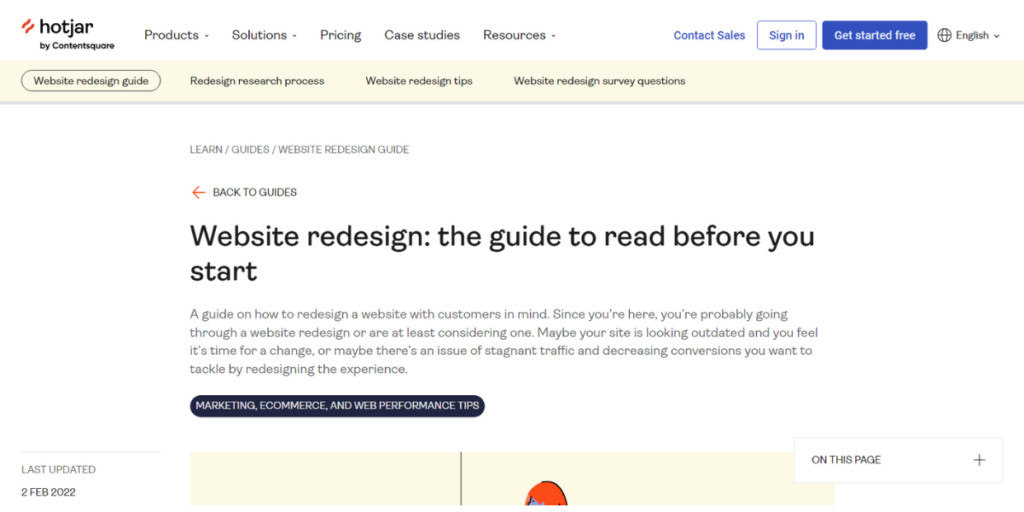
Hotjar is an all-in-one user experience analysis and feedback software that enables entrepreneurs to comprehend and analyze the ways users convey information through their websites and web applications. The features it offers include a heat map, session replay, feedback poll/survey, conversion funnel, and form analysis to help businesses understand their users better and improve their experiences.
Key Features:
- Heatmap and Session Recording
- Feedback received through the polls and surveys
- Conversion funnel analysis
- analytics and feedback
Pros:
- Sharp tips and tricks in the field of user experience
- It is also easy to use and install
- Affordable pricing plans
- Comprehensive support resources
Cons:
- Lack of more advanced attributes in data analysis
- All the aforementioned processing does not happen in a real-time fashion.
- Limited integration options
Website: https://www.hotjar.com
8. HubSpot
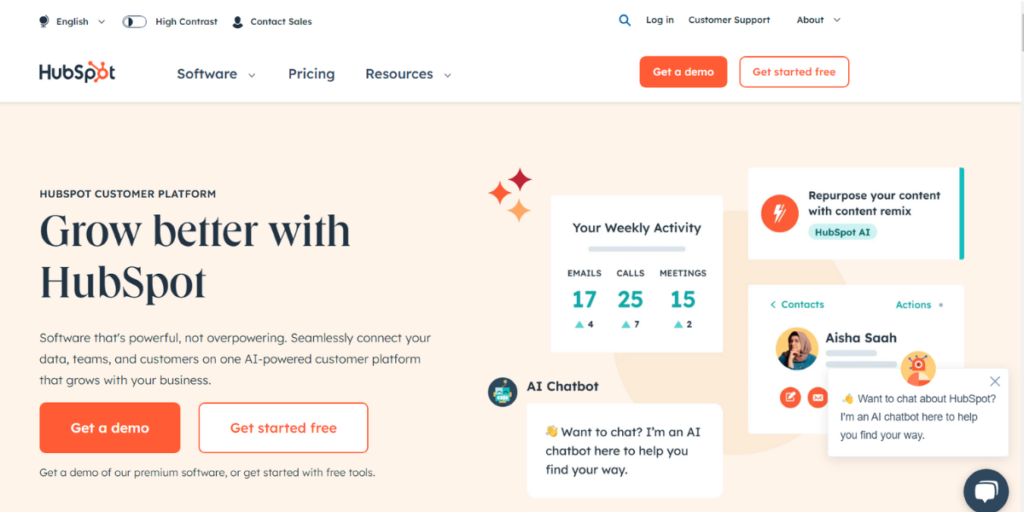
HubSpot is a single platform for Inbound marketing, sales, and customer service that also offers website traffic analysis and analytical reporting as part of marketing software. It provides the facility to track traffic sources and campaigns, assess the performance of landing pages and emails, calculate the leads generated and their conversion rate, and is compatible with other HubSpot products.
Key Features:
- Source of traffic and further advertisement of the related campaign.
- Website/homepage and email metrics assessment
- Collection of leads and the correspondence of the reaction to their consequent conversion.
- Integrates with other HubSpot tools.
Pros:
- Holistic marketing and sales solution
- The integration of this tool with other tools in HubSpot allows for easy work between all of them.
- Easy-to-use tools for working with analytical tables and easy creation of reports.
- The excellent quality of customer support and the resources provided.
Cons:
- Simple interface with few features of preview for advanced web analytics
- It is more costly than individual analytical programs and applications.
- The analyses centered mainly on marketing and sales-related data.
Website: https://www.hubspot.com
9. Chartbeat
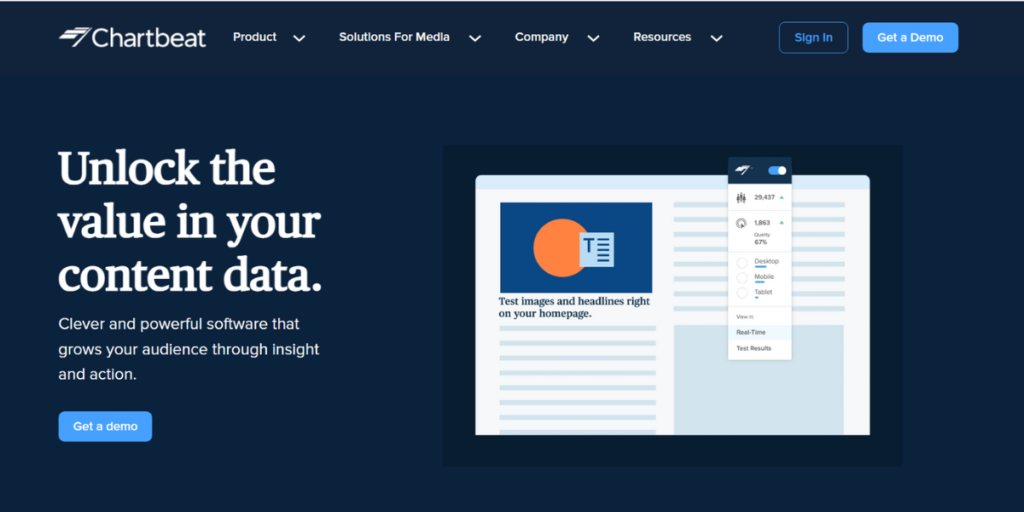
It is a real-time content analytics platform that is fairly made for companies dealing in media and publishing. It offers features such as live traffic and audience metrics, content consumption and monetization reports, social media, and custom metrics and reporting tools, aiding publishers in knowing consumers’ behavior as they engage with their content.
Key Features:
- Data obtained from real-time traffic and audience engagement.
- Information regarding engagement, share of voice, and other performance metrics for each content
- Social media passive observation
- Data Visualisation and Dashboards
Pros:
- Real-time data and insights
- The features of the analytical power of content performance
- integration with content management systems
- Feature-rich and easy to use with a full range of reports.
Cons:
- The software is primarily intended for publishing sites
- Compared with other more general web analytics tools that may be freely available on the web.
- There are mostly low or average resources available for customers.
Website: https://chartbeat.com
10. SimilarWeb
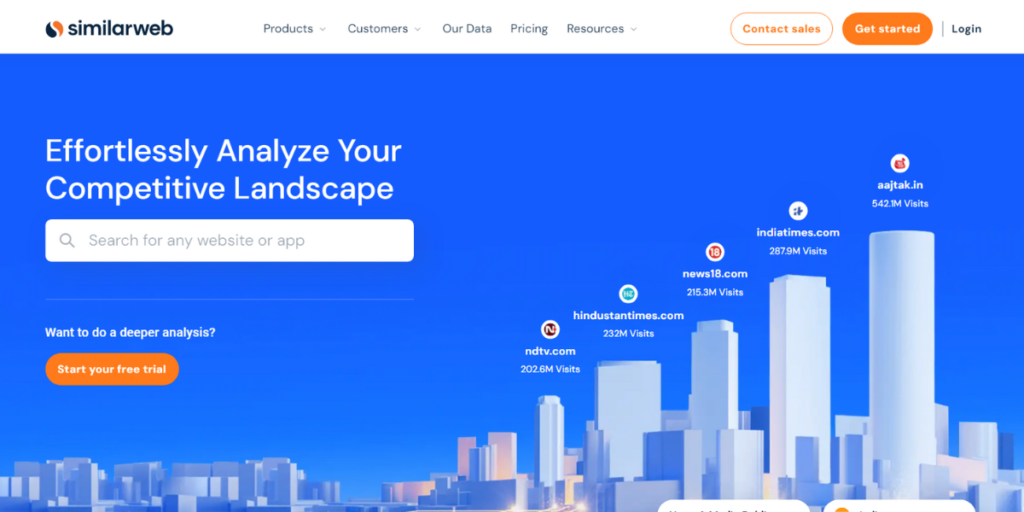
SimilarWeb offers analytics services for web traffic and engagement as well as data on competitors and business entities. Some of the features it has include competitor comparison and evaluation, information on the target market and its customers, information on traffic sources and distribution, and details on the use of mobile applications and advertising.
Key Features:
- Self-analysis and benchmark with competitor
- Market audience knowledge and assorted demographic information
- Identification of traffic sources
- Intelligence on mobile apps and advertising
Pros:
- Competitive intelligence data that would include wide-ranging information
- Traffic analysis and the demographics of the audience
- Easy operation
- Small businesses can enjoy cheap prices depending on the variety of services they require.
Cons:
- There is often little real-time data and fewer works with insights.
- No information is collected or used on this website and its server for consumer tracking purposes.
- Few customer-support relations
Website: https://www.similarweb.com
Read More: Best CRM Systems for Small Businesses
11. Ahrefs
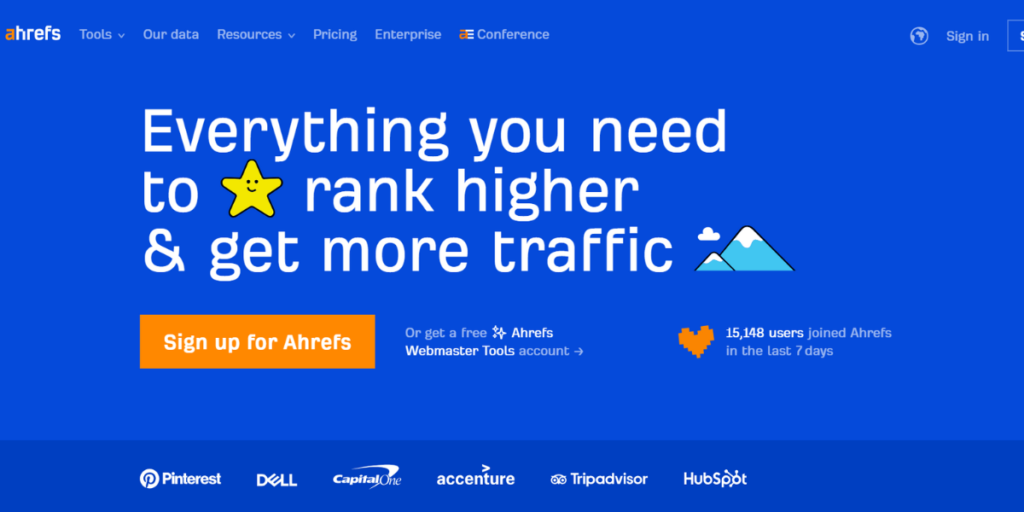
Ahrefs is a tool for SEO analysis that offers Traffic Finder and Competitor Explorer as its main features. They provide backlink analysis & link building, keyword research & rank tracking, site audit & technical SEO, and content exploration & research capabilities, which in return make it a significant resource for SEO and online marketing.
Key Features:
- Tools for analyzing backlinks and building website links
- Keyword research and rank-checking
- On-site assessment/analysis of the technical factors affecting organic search performance
- Knowledge-browsing and search-related features
Pros:
- The integrated SEO and link analysis tools are also among the best in the industry.
- It requires detailed information concerning Web traffic and the website’s performance.
- Having insights into competitor and industry factors
- Easy to navigate and suitable for reporting
Cons:
- Few additional non-SEO feed and analysis tools
- They are relatively more costly compared to what one would get from simple web analytics.
- steep learning curve
Website: https://ahrefs.com
12. Woopra
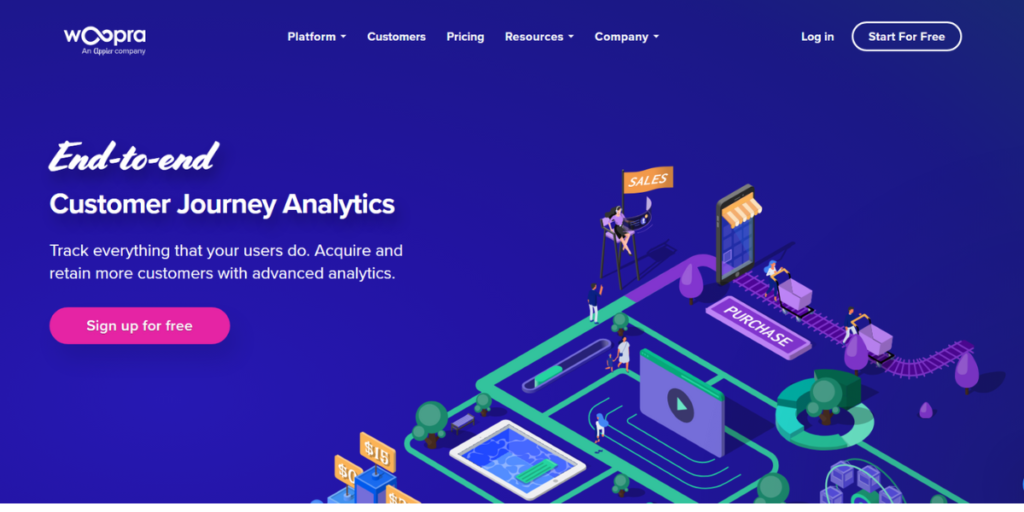
Woopra is a Customer Journey Analytics tool that allows organizations to capture and understand how users interact with them through different online channels and different activities such as website visits, mobile applications usage, and campaigns or promotions. It provides live user behavior tracking, accurate targeting and customer personas, a visual customer journey, and built-in messaging and communication features.
Key Features:
- Tracking of users’ time and activity on particular sites
- A more refined approach to segmentation and dividing the target population into groups.
- Analyzing the customer satisfaction map and the sales funnel.
- Administrative systems that facilitate the use of automatic messages and interactions
Pros:
- Findings on the users’ activity and the customers’ flow
- Collectability and delivery of data at the point of data collection and generation
- The superiority of this application derives from a remarkably high level of segmentation and filtering of relevant information.
- Flexible data visualization and reporting
Cons:
- Some are more expensive than simple analyzing tools used to monitor website traffic
- More challenging to master the product when it comes to the full functionality and options
- Fewer customers can afford to pay for specialized support services.
Website: https://www.woopra.com
Conclusion:
It can thus be concluded that the right website analytics tools can be valuable for your business. It can be another crucial factor for optimizing your online presence and excelling in your growth.
The top 12 website Analytics tools mentioned in this article will definitely help your small or medium-sized businesses.
Read More: 25 Best Lead Generation Tools
FAQs:
Name free web analytics tools?
Google Analytics is known to be a free web analytics tool that is provided by Google.
Do website analytics tools count mobile app usage?
Some of the analytics tools (like Mixpanel, Woopra) track and analyze user actions in a similar way on both web and mobile.
Is Website Analytics Tools For Small Businesses?
Absolutely. Most website analytics tools – such as Google analytics, Matomo or HubSpot – have cheap or even free plans for the small sized businesses.
Can website analytics tools provide real-time data?
Yes, there are many real-time data processing and reporting tools around such as Google Analytics, Mixpanel and Chartbeat.
